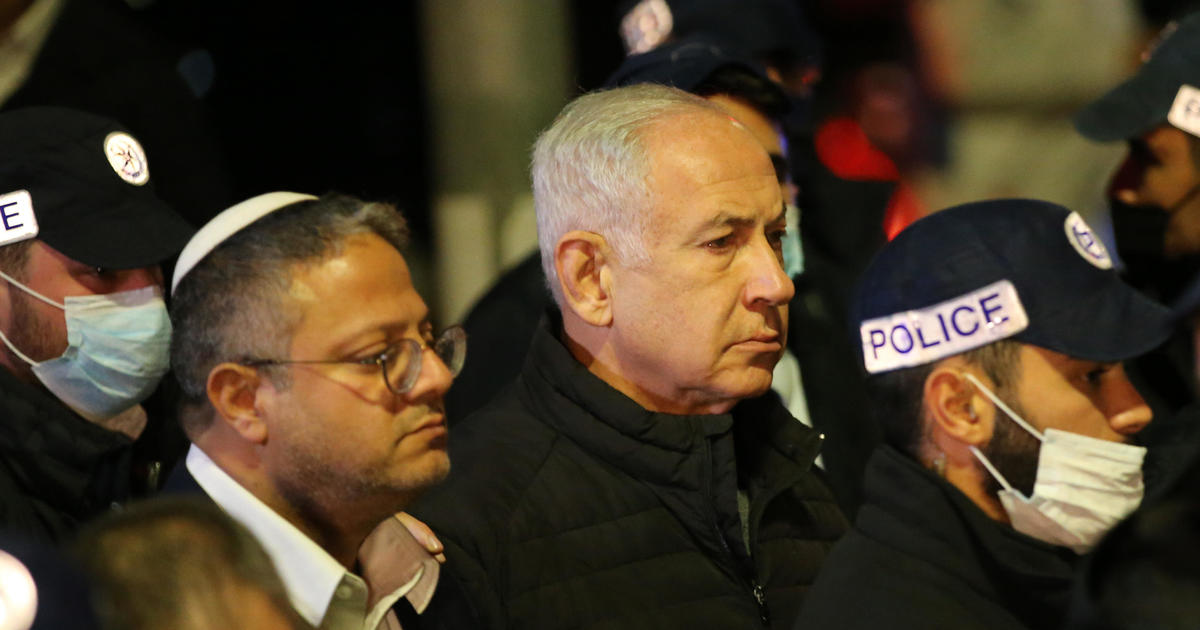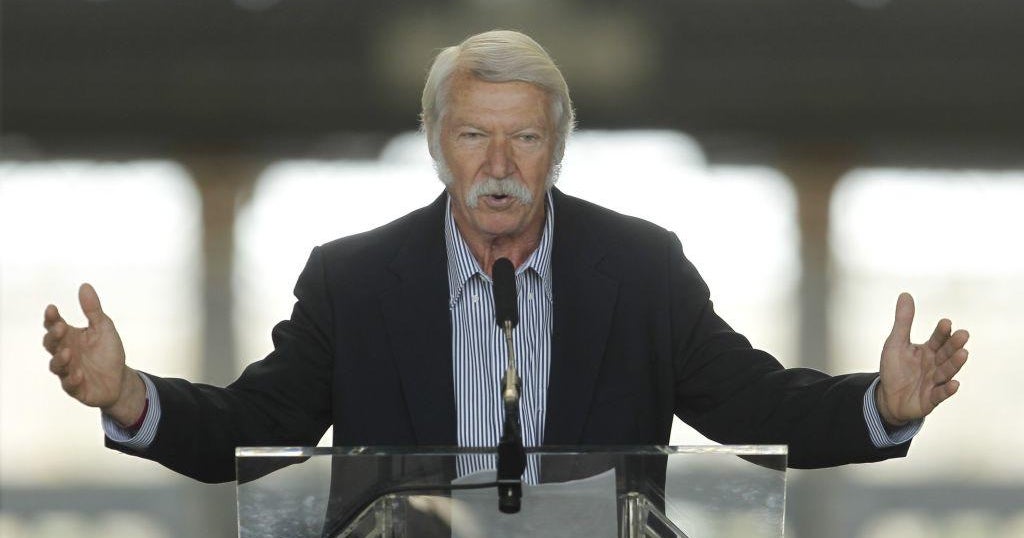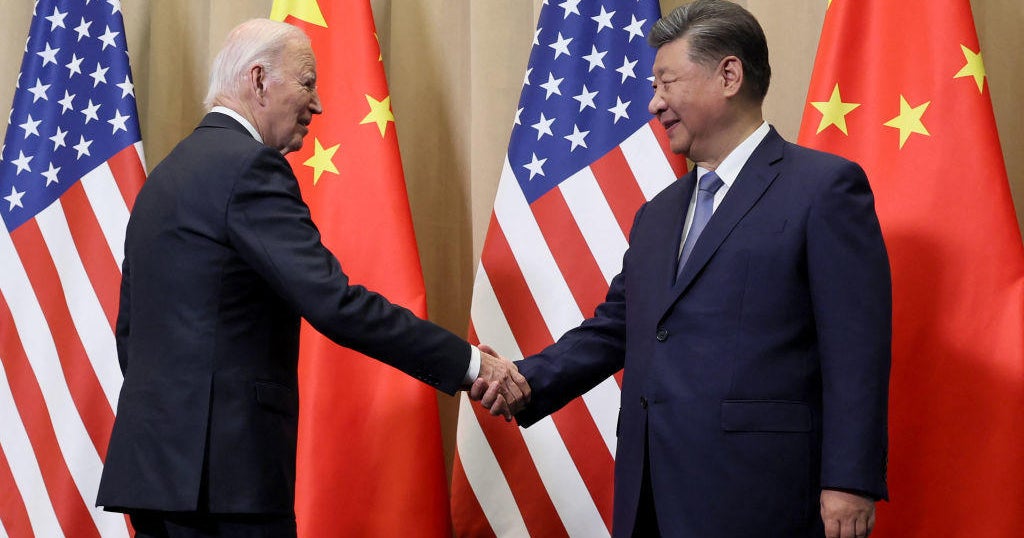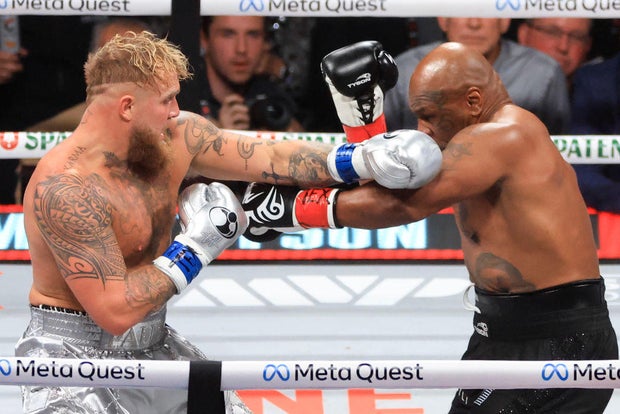CBS News
Israel’s far-right lashes out at Biden over Gaza war stance as Netanyahu vows Rafah offensive will happen

Tel Aviv — Some of Israel’s most senior far-right politicians lashed out Thursday at President Biden after he warned the White House could withhold more weapons shipments to the Israeli military if it launches a major military ground assault on Gaza’s southernmost city of Rafah.
Israel’s ultra-nationalist, firebrand National Security Minister Itamar Ben-Gvir posted a short message on social media suggesting, with a heart emoji, that the militant group Hamas, which Israel has been at war with for seven devastating months in Gaza, loved Mr. Biden for his threat to withhold the weapons.
Parliamentarian Dan Illouz, a lawmaker from Prime Minister Benjamin Netanyahu’s own Likud party, said the U.S. leader’s action, “not only jeopardizes Israel but the entire free world.”
Mostafa Alkharouf/Anadolu Agency/Getty
Israel’s President Isaac Herzog, considered a more moderate politician, who is not a member of Netanyahu’s far-right coalition government, appeared to chastise his more extreme colleagues on Thursday. Speaking at an event to mark the allies’ victory in Europe over Nazi Germany during World War II, Herzog lauded Israel’s “greatest ally the United States of America,” thanking Mr. Biden by name for his support “from the first day of the war.”
“Even when there are disagreements and moments of disappointment between friends and allies, there is a way to clarify the disputes and it is beholden upon all of us to avoid baseless, irresponsible and insulting statements and tweets that harm the national security and the interests of the State of Israel,” Herzog added.
Speaking Wednesday to CNN, Mr. Biden said it would be “just wrong” if U.S.-supplied weapons were used in attacks that led to mass civilian deaths in a full-scale Rafah ground offensive. If Israel does go ahead with such an operation, he said the U.S. was “not going to supply the weapons and artillery shells used” for it.
U.S. officials have confirmed that the Biden administration paused a weapons shipment to Israel last week — of 1,800 one-ton bombs and 1,700 500-pound bombs — over concern that the Israel Defense Forces would drop them on Rafah.
The southern Gazan city is one of the most densely-inhabited places on the planet, with an estimated 1.4 million Palestinians having sought shelter there from across the decimated territory.
The IDF ordered people in the eastern part of the city to leave this week, sparking a desperate exodus of thousands — many of whom had already been forced to flee from other locations multiple times.
IDF tanks rolled in to take control of the Gaza side of Rafah’s crucial border crossing with Egypt on Tuesday, soon after the evacuation order was issued, and Israel said it was carrying out “a precise counterterrorism operation to eliminate Hamas terrorists and infrastructure” in the area.
“They’re not going to get our support if in fact they go into these population centers,” said Mr. Biden. “We’re not walking away from Israel’s security — we’re walking away from Israel’s ability to wage war in those areas.”
Mr. Biden stressed that the U.S. would, “continue to make sure Israel is secure in terms of Iron Dome and their ability to respond to attacks that came out of the Middle East recently.”
Netanyahu has said in recent days — amid mounting pressure from the U.S. and other global partners to limit the scope of operations in Rafah — that if “Israel is forced to stand alone, Israel will stand alone.”
He’s vowed to go ahead with the Rafah operation, which he’s said for weeks is necessary to destroy hundreds of Hamas fighters holed up in the city. Rafah is considered the last stronghold of the group that ruled Gaza for almost two decades, before it sparked the current war with its deadly Oct. 7 terrorist attack on Israel.
Israel says Hamas killed about 1,200 people with that assault and took some 240 others hostage. About 100 of those captives are still believed to be alive in Gaza, including five U.S. nationals.
The enclave’s Hamas-run Health Ministry, meanwhile, says Israel’s retaliatory war has killed almost 35,000 people. Gazan officials do not distinguish between combatant and civilian casualties, and the IDF, without offering evidence, claims to have killed about 10,000 terrorists with its response to the Oct. 7 attack.
Getty/iStockphoto
Since Israel heralded the start of its Rafah operations this week, frightened Gazans have fled daily from Israeli airstrikes, flooding the city’s last functioning hospital, the Kuwaiti Hospital, with the dead and wounded.
“The health situation in Rafah is now very miserable,” Dr. Jamal Al-Humss, the hospital’s director-general, told CBS News. He said about 300,000 people in Rafah are now relying on the facility, which he warned was overflowing and understaffed.
In recent days, Hamas — long considered a terrorist group by the U.S. and Israel — has continued to launch rocket and mortar attacks from Rafah. One strike on Sunday killed four Israeli soldiers.
Israeli national security expert Chuck Freilich, at the Institute for National Security Studies at Tel Aviv University, accepts that there are likely still four Hamas battalions operating in Rafah. But speaking with CBS News on Thursday, he argued that Israel had already won and lost the war with Hamas.
“If you look at it from a purely military perspective, I think Israel won the war by the middle of December,” he said. “We had essentially destroyed Hamas as a military force.”
“At the same time, if you mean the overall strategic picture of the war, Israel may have lost. Its international standing is bad, and now we’ve seen this emerging divide with the United States,” said Freilich. “For Hamas, it’s an incredible achievement, and for us, it’s a very severe problem.”
CBS News’ Tucker Reals contributed to this report.
CBS News
Bela Karolyi, polarizing U.S. gymnastics coach, dies at 82

Bela Karolyi, the charismatic if polarizing gymnastics coach who turned young women into champions and the United States into an international power, has died. He was 82.
A spokesperson for USA Gymnastics confirmed to CBS News by email that Karolyi died Friday. No cause of death was given.
Karolyi and wife Martha trained multiple Olympic gold medalists and world champions in the U.S. and Romania, including Nadia Comaneci and Mary Lou Retton.
Ron Jenkins/Fort Worth Star-Telegram/Tribune News Service via Getty Images
“A big impact and influence on my life,” Comaneci, who was just 14 when Karolyi coached her to gold for Romania at the 1976 Montreal Olympics, posted on Instagram.
The Karolyis defected to the United States in 1981 and over the next 30-plus years became a guiding force in American gymnastics, though not without controversy. Bela helped guide Retton — all of 16 — to the Olympic all-around title at the 1984 Games in Los Angeles and memorably helped an injured Kerri Strug off the floor at the 1996 Games in Atlanta after Strug’s vault secured the team gold for the Americans.
Karolyi briefly became the national team coordinator for USA Gymnastics women’s elite program in 1999 and incorporated a semi-centralized system that eventually turned the Americans into the sport’s gold standard. It did not come without a cost. He was pushed out after the 2000 Olympics after several athletes spoke out about his tactics.
It would not be the last time Karolyi was accused of grandstanding and pushing his athletes too far physically and mentally.
During the height of the Larry Nassar scandal in the late 2010s — when the disgraced former USA Gymnastics team doctor was effectively given a life sentence after pleading guilty to sexually assaulting gymnasts and other athletes with his hands under the guise of medical treatment — over a dozen former gymnasts came forward saying the Karolyis were part of a system that created an oppressive culture that allowed Nassar’s behavior to run unchecked for years.
Still, some of Karolyi’s most famous students were always among his staunchest defenders. When Strug got married, she and Karolyi took a photo recreating their famous scene from the 1996 Olympics, when he carried her onto the medals podium after she vaulted on a badly sprained ankle.
CBS News
Mike Tyson says he has “no regrets” after losing boxing match to Jake Paul

Despite losing his boxing match to Jake Paul, Mike Tyson in a social media post Saturday said he had “no regrets” to getting “in ring one last time.”
The boxing legend was defeated by social media star Jake Paul in a highly anticipated fight on Friday night with an age difference of over three decades between the two contenders.
Netflix said Saturday that 60 million households worldwide tuned in to watch the match. The two fighters went eight full rounds, with each round two minutes long. Paul defeated Tyson by unanimous decision and the 27-year-old upset boxer and 58-year-old former heavyweight champion hugged afterward.
Paul was expected to earn about $40 million from the fight, and Tyson was expected to take around $20 million for the fight, according to DraftKings and other online reports.
Getty Images
Tyson said on his social media that “this is one of those situations when you lost but still won. I’m grateful for last night.”
The fight almost didn’t happen after Tyson experienced an ulcer flare-up while on a plane in March. He addressed his illness Saturday, writing that he “almost died in June.” He said he had eight blood transfusions and “lost half my blood and 25lbs in hospital and had to fight to get healthy to fight so I won.”
Tyson retired from boxing in 2005 after a 20-year career. He last fought in a 2020 exhibition match against former four-division world champ Roy Jones Jr.
“To have my children see me stand toe to toe and finish 8 rounds with a talented fighter half my age in front of a packed Dallas Cowboy stadium is an experience that no man has the right to ask for. Thank you,” he said.
Alex Sundby and
contributed to this report.
CBS News
In their final meeting, Xi tells Biden he is “ready to work with a new administration”

In their final meeting, China’s leader Xi Jinping told U.S. President Biden that his nation was “ready to work with a new administration,” as President-elect Donald Trump prepares to take over.
The two leaders gathered Saturday on the sidelines of the annual Asia-Pacific Economic Cooperation summit. Mr. Biden was expected to urge Xi to dissuade North Korea from further deepening its support for Russia’s war on Ukraine. It marked their first in-person meeting since they met in Northern California last November.
Without mentioning Trump’s name, Xi appeared to signal his concern that the incoming president’s protectionist rhetoric on the campaign trail could send the U.S.-China relationship into another valley.
“China is ready to work with a new U.S. administration to maintain communication, expand cooperation and manage differences so as to strive for a steady transition of the China-U.S. relationship for the benefit of the two peoples,” Xi said through an interpreter.
LEAH MILLIS/POOL/AFP via Getty Images
Mr. Biden, meanwhile, spoke in broader brushstrokes about where the relationship has gone and reflected not just on the past four years, but on their long relationship.
“Over the past four years, China-U.S. relations have experienced ups and downs, but with the two of us at the helm, we have also engaged in fruitful dialogues and cooperation, and generally achieved stability,” he said.
Mr. Biden and Xi, with top aides surrounding them, gathered around a long rectangle of tables in an expansive conference room at Lima’s Defines Hotel and Conference Center.
There’s much uncertainty about what lies ahead in the U.S.-China relationship under Trump, who campaigned promising to levy 60% tariffs on Chinese imports.
Bobby Djavaheri, president of Los Angeles-based Yedi Houseware Appliances — which manufactures its products in China — told CBS News in an interview this week that such tariffs “would decimate our business, but not only our business. It would decimate all small businesses that rely on importing.”
Trump has also proposed revoking China’s Most Favored Nation trade status, phasing out all imports of essential goods from China and banning China from buying U.S. farmland.
Already, many American companies, including Nike and eyewear retailer Warby Parker, have been diversifying their sourcing away from China. Shoe brand Steve Madden says it plans to cut imports from China by as much as 45% next year.
White House national security adviser Jake Sullivan said Biden administration officials will advise the Trump team that managing the intense competition with Beijing will likely be the most significant foreign policy challenge they will face.
It’s a big moment for Mr. Biden as he wraps up more than 50 years in politics. He saw his relationship with Xi as among the most consequential on the international stage and put much effort into cultivating that relationship.
Mr. Biden and Xi first got to know each other on travels across the U.S. and China when both were vice presidents, interactions that both have said left a lasting impression.
“For over a decade, you and I have spent many hours together, both here and in China and in between. And I think we’ve spent a long time dealing with these issues,” Mr. Biden said Saturday.
But the last four years have presented a steady stream of difficult moments.
The FBI this week offered new details of a federal investigation into Chinese government efforts to hack into U.S. telecommunications networks. The initial findings have revealed a “broad and significant” cyberespionage campaign aimed at stealing information from Americans who work in government and politics.
U.S. intelligence officials also have assessed China has surged sales to Russia of machine tools, microelectronics and other technology that Moscow is using to produce missiles, tanks, aircraft and other weaponry for use in its war against Ukraine.
And tensions flared last year after Mr. Biden ordered the shooting down of a Chinese spy balloon that traversed the United States.














